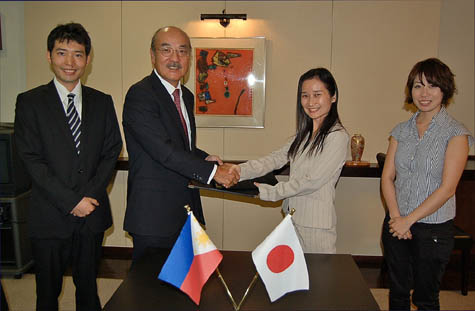
Japanese Ambassador Toshinao Urabe congratulates Country Director Yukiyo Nomura of ICAN Philippines, after signing the grant contract for “ Community Development Project with the Children of Indigenous Community in Mindanao (Phase 1) ,” on January 19, 2012 at the Embassy of Japan. The ceremony was witnessed by the officials of ICAN Philippines and the Embassy of Japan. |
Japanese Ambassador Toshinao Urabe and Ms. Yukiyo Nomura, Country Director of ICAN Philippines signed the grant contract for ‘Community Development Project with the Children of Indigenous Community in Mindanao' at the Embassy of Japan on January 19, 2012. The project, amounting to US$ 209,484 (approximately 9 million pesos), is funded through the Grant Assistance for Japanese NGO Projects, a small-grant funding program of Japan's Official Development Assistance (ODA).
In southern Mindanao, indigenous people such as B'laan or T'voli have long earned their living by hunting animals and gathering wild foods since ancient times. However, they have been forced to leave their lands and settle in higher places after the Philippine government encouraged the immigration from Luzon and Visayas to Mindanao in the 1930's. The presence of multinational companies since 1960's has also accelerated the trend. Even today, the indigenous people face discrimination from people in lower land, and lead a harsh living in higher lands far from urban areas. Barangay San Jose, General Santos City, which is ICAN Philippines' project site, also belongs to such areas. People in the barangay needs assistance in areas like education, health, and livelihood. It is also critical to take measures for getting rid of the sense of inferiority that the local indigenous people have long held.
Under the project, two classrooms will be constructed at the Shuttle Elementary School, Barangay San Jose. Desks, chairs and blackboards will also be purchased. These measures will improve the learning environment of the school. In addition, seminars will be conducted for schoolchildren and teachers in the schools of Barangay San Jose to deepen their understanding on the culture of indigenous people. The project will promote the school-building that is more suitable for indigenous children so that the children will accept their identity positively in the future.
Various workshops will also be conducted for local indigenous people in Barangay San Jose. In the remote, mountainous barangay, there are some areas where virtually no doctors reside and villagers can lose their lives without any treatment. Under the project, the local people will learn expertise on health and basic medical treatment in order them to engage in the prevention of diseases and conduct basic first-aid treatment by themselves. In addition, the project will also take care of residents' livelihood activities through reviving their traditional crafts. People will be equipped with techniques to improve their craft-making and take in basic business skills, such as accounting and administration.
The Grant Assistance for Japanese NGO Projects started in the Philippines in 2002. Since then, the Japanese Government has disbursed approximately 1 65 million pesos for a total of 2 7 projects in the Philippines. Japan believes that this project will strengthen not only friendship between the peoples of Japan and the Philippines but also the existing strategic partnership between Japan and the Philippines.
Japanese Version


